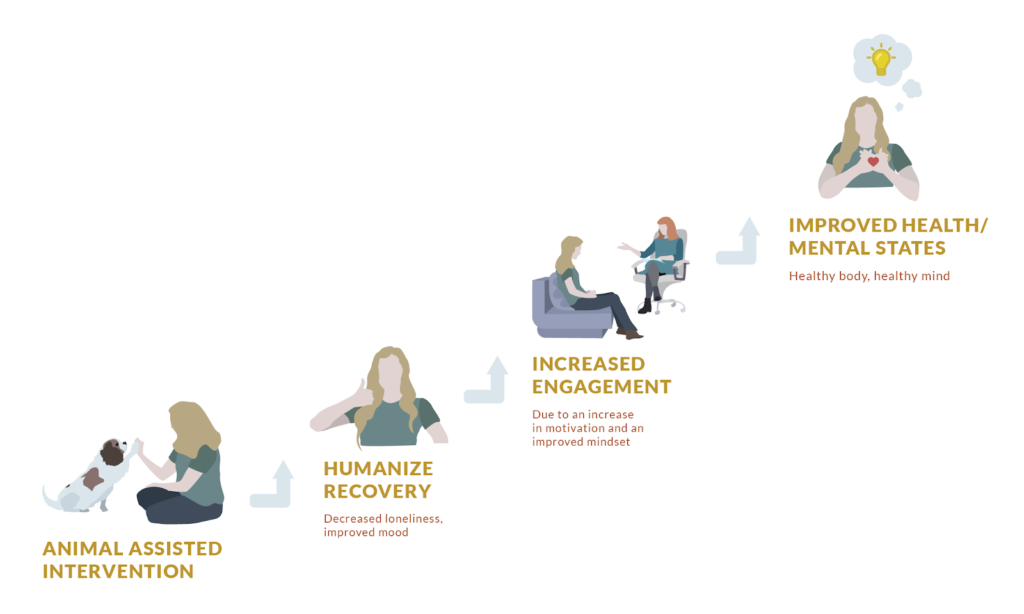
A furry hug from man’s best friend can be good for your health.
We already knew it!
And science backs it up–our domestic pets can lift our spirits and help us refocus our energies during stressful times and emotional struggles.

Interactions between animals and people are healthy approaches to recovery and healing and should be considered a viable tool as a treatment approach.
"Doctors and nurses have traditionally been of the mindset that if we just give patients the 'right' medication, their psychological status will improve," says Dale Needham, a professor of medicine and physical medicine and rehabilitation at the Johns Hopkins School of Medicine and senior author of a 2018 medical journal editorial.
"In fact, we probably need to give less medicine and rely more on nonpharmaceutical interventions, such as music therapy, relaxation training, and animal-assisted therapy to help improve patients' psychological status."

The editorial cites instances of reduced suffering and loneliness, as well as improved mood and treatment participation. Whether in a hospital, treatment center, or at home, the benefits of pets in daily life are universal.
The Centers for Disease Control back this data up, noting that the care and maintenance of animals promote being outside, socializing, and more physical activity. The internal positives of exercise are measurable with blood pressure, cholesterol, and triglycerides.
And knowing you have a loving pet waiting for you at home reduces loneliness and feelings of depression.
Humans and Pets Have Bonded Through Centuries
We’ve all heard stories about the bonds between pets and owners. The 1963 book, “The Incredible Journey” details the true story of two dogs and a cat who made their way home through 300 miles of the Canadian wilderness and was later made into the Disney movie “Homeward Bound: The Incredible Journey.”
This human/pet connection has been traced back a long time. The oldest pet cat/human burial was found on the Mediterranean island of Cyprus and dates back 9,500 years. Dog and human remains were buried together as long ago as 6,000 years on the Iberian Peninsula on the southern side of Spain, also along the Mediterranean Sea.
Love for animals has continued to grow and in the United States 3.2 million pets are adopted every year, according to the American Society for the Prevention of Cruelty to Animals. It estimates the country loves its animals so much so that 78 million dogs and 85.8 million cats are owned in the United States. Dogs are in 44% of all households and cats are in 35% of homes.
How Can a Pet Help With Addiction Recovery?
Pets Support Us Like Family - Great For Addiction Treatment
Pets, simply put, are healers. Healers that reduce pain and anxiety, according to the Mayo Clinic. They offer a soothing balm to the mental fortitude that is tired from struggles with mental or substance disorders.
The type of support that pets provide can help you get through the rough times. When our lives are taken over by the powerful forces of addiction, people often lose their way in life. People may make poor choices, make new priorities, and forget to take care of themselves.
Animals can often bring us back to what matters most. They give a feeling of love that nothing else can and they remind people of who they once were. Anyone who has a pet at home knows just how important they are. They become a part of the family almost instantly. They provide unconditional love and devotion and can brighten even the worst day with a single snuggle.

Pet Adoption Can Help With Your Treatment For Addiction
The early phases of recovery can often be the most difficult. As your body and mind adjust to a new way of thinking and feeling, a wide range of emotions can occur. Feelings of inadequacy, loneliness, deep remorse, depression, and anxiety are all very normal feelings in early recovery. You may feel overwhelmed by the new emotions, and not quite understand how to process them.
Having a pet in your life can make this process a little bit easier. The comfort received from pets is unlike any other. When the furry little creature that you call your best friend crawls into your lap and starts giving you their undivided attention and love, all of the world’s problems can seem to disappear.
Because of research continually pointing to how pets benefit your chances for successful recovery, many rehab centers are beginning to incorporate animals into their therapy programs. The benefits that animals can provide are excellent for a person’s well-being and overall health.
How Animals Aid In Addiction Treatment
When a person is addicted to a drug or alcohol, they will face many challenges during their recovery. This is largely due to their brain being rewired during the time they were using the substance. Drugs or alcohol changed the way their brain thinks and feels.
The brain releases a chemical known as dopamine whenever it experiences something pleasant. Whether it is the embrace of a loved one, a delicious meal, or sharing laughter with friends, the body is programmed to react by releasing a normal amount of dopamine into our system. This feeling is memorized by the brain so that people will remember it and seek it again in the future.
When a person takes in a substance such as drugs or alcohol, it ultimately reaches the bloodstream and brain. When the brain receives the substance, it causes an abnormally high level of dopamine to be released, giving an extremely pleasant or euphoric feeling. This artificial stimulation causes the brain to react in a way that encourages the person to seek more of that substance so that they can feel that same pleasure again.
Unfortunately, drugs and alcohol release such excessive amounts of dopamine that people are no longer able to feel pleasure from everyday things. When beginning the process of recovery, it can be difficult to find happiness in much of anything. Your brain is still trying to get back to normal.
When introduced in addiction treatment programs, therapy animals can help stimulate the brain’s normal production of dopamine. Animal companions can also help you form healthy bonds and regain a sense of responsibility.
Assisted Therapy - Animals and Addiction
Similarly, the care, maintenance, and bond of a pet are therapeutic for those with mental disorders.
- They can be a companion for a veteran with post-traumatic stress disorder because they also are alert and provide an ability to let the veteran’s guard down a little knowing someone is on duty.
- A lonely homebound widow/widower has a purpose to daily life through the care and love for a pet.
- A child grieving the loss of a close family member has a buddy by his/her side to hold in the dark of night.
The security and routine an animal brings can provide emotional support.
If you go outside to walk the dog, you might stop in passing with another pet walker and enjoy a quick chat while the dogs play. These periods of interaction lighten your mood and may even get you a new friend to wave to in the neighborhood, building a sense of community and wellness.
And as the healing begins and the spirit grows stronger, people have an active friend to play fetch with, go on jogs together, or pat in their lap while they read a book.
The Anxiety and Depression Association of America sums up it all up with three words: “the pet effect.”
What to Consider When Thinking of an Animal for Treatment

On your journey to recovery, you may have already been thinking about how to continue your treatment goals in positive ways as you return home. If you have been on the fence about bringing Fido or Whiskers home to live, animal welfare groups have suggestions to make sure a successful pairing takes place.
Consider the following in a pet:
- Animal life expectancy
- Size of pet
- Expected costs (food, veterinary care)
- Exercise frequency
- Cleaning time of pet and waste
- Training (for puppies and rescues that need to learn your house expectations)
Consider the following in your daily life:
- Pet policy in the community
- Other people in the household (ages of young children, allergies/illnesses, fall risks)
- Available time for feeding, caring, exercising, training
- Supervising young children around animal
If adoption isn’t in your future, there are other ways to spend time with animals. Shelters welcome volunteers, barns need help with horses and other livestock, or you may even look into dog-walking and pet-sitting opportunities.
If your pet interests go a bit less mainstream (think exotic birds, ferrets, lizards, or horses), you may want to do some research with a local organization or veterinarian to see what to expect.
Wherever your animal search takes you, remember it’s important to research breeds and avoid puppy mills to make sure your animal is healthy. Animal rescues by breed and mixed-breed animals can be found at shelters and searching websites and Facebook pages. You may be saving a life while saving costs on a purebred.
To learn more about how healing can begin in Pinnacle Peak Recovery’s friendly, family-like setting, you can call us at 866-377-4761.
Animal Assisted Therapy FAQs:
Can Pets Improve Your Mental Health?
Yes, pets can improve your mental health. Their companionship can help ease loneliness while reducing stress, anxiety, and depression. One way pets can help with anxiety is to give a person something to focus on as a distraction from their worrisome thoughts. Snuggling a kitten can bring a smile to lift spirits.
How do Pets Calm You Down?
Pets, especially dogs and cats, can sense moods and adjust responses proportionately. A dog or cat may get anxious themselves if they see you crying. As they sniff around you to see the cause and comfort you, you automatically feel compelled to reach out and pet them for comfort. This sharing of emotions helps bond pets and humans.
Another example is a horse, which is extremely sensitive to behavior. The simple act of grooming a horse is soothing and helps calm a person, as well as gain the horse’s trust through consistent care.
What Pets Can Help With Anxiety?
Most people think of dogs and cats when they think of pets. But therapy animals can be found with horses, guinea pigs, and rabbits, most any animal that can be trained, friendly, and trusted around people. Some people go to the extreme and find comfort with snakes and dolphins.
What Effect do Pets Have on Humans?
While pets are known for their benefits for mental health, they also can improve physical health with lower blood pressure, cholesterol, and lowered triglycerides. This is due to increase activity with outside socialization and exercise.
